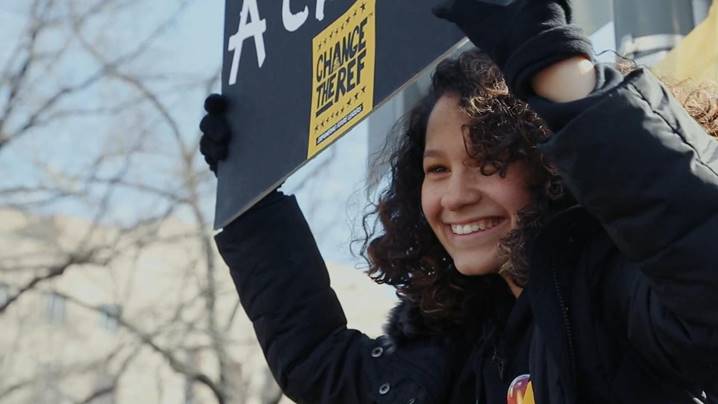The Tribeca Film Festival has been a launching pad for topical documentaries, and a pair of them premiered over the first couple of days of this year’s event that highlight the harrowing danger that face the youth of this country. The other day, I saw a major outlet on Twitter refer to the 20 years since Columbine as the “mass shooter era,” perhaps the most depressing label of a pair of decades in history. And yet it’s where we are, an era in which gun violence is a fact of life and my kids have to go through lockdown drills. And gun violence is impacting the country on a micro level, in the stories of people whose families are torn about by the rise of crime that happens at the end of a weapon.
The macro issue of gun violence is addressed head-on in the moving “After Parkland,” a chronicle not so much of what happened on Valentine’s Day 2018 at Marjory Stoneman Douglas High School in Florida, but how the community and nation responded to the attack. Directors Emily Taguchi and Jake Lefferman provide the most access to the Parkland story that we’ve seen in a film so far, clearly on the scene with their subjects shortly after the attack. They profile several people, including survivors David Hogg, Victoria Gonzalez, Sam Zeiff, and Dillon McCooty—along with fathers who lost their children, Manuel Oliver and Andrew Pollack.
To say the emotion in “After Parkland” is raw would be an understatement. There’s a fearless intimacy to the interviews that shows how much these people trusted Taguchi and Lefferman. You won’t forget the emotion on Pollack’s face when he talks about his lost daughter, but you’ll also remember how he’s using his tragedy to enact change. Of course, it’s impossible to make a movie like “After Parkland” that won’t be misinterpreted as a threat against gun owners, but Pollack tries several times to turn the conversation back to something on which we should all agree—our kids should be safe at school. How do we do that? How do we stop this? How do we end the “mass shooter era”?
So many of the stories of “After Parkland” are interesting enough that they could have sustained their own documentary, and that makes for a film that can feel unfocused at times. Instead, the film ends up having a cumulative effect—these are all survivors trying to get through the day in their own way. Some like Hogg and Pollack fight to change a clearly broken system, while others grieve on their own. And it’s impossible not to consider the truly tragic postscript about the increase in suicides for Parkland survivors. An event like a school shooting doesn’t have an ending—its impact ripples out long after the shots are fired. I just keep hoping someone has the courage to figure out how to stop these ripples from tearing our country apart.

While people like David Hogg are internationally recognized, the faces in the intimate “17 Blocks” are unlikely to be familiar to viewers at Tribeca. “This American Life” contributor Davy Rothbart befriended a D.C. family known as the Sanfords. It turns out that the Sanfords had been filming their life just 17 blocks from the U.S. capital since 1999, and Rothbart has assembled their home movies into a document of an American family dealing with poverty, addiction, and violence. It is a remarkably raw and heartfelt piece of filmmaking that actually could have sustained a longer form like a docu-series as it jumps so many time gaps over the last two decades.
When we meet Emmanuel Sanford, he’s a wide-eyed 9-year-old capturing his family on camera. Sadly, life for the Sanfords from 1999 to 2019 isn’t easy. The family tries to stay together as much as possible, but crime and addiction become a part of their legacy, as does heartbreaking tragedy. It’s fascinating to watch cycles of addiction and violence play out over the years, and realize that there are a lot of families like the Sanfords out there. At its best, “17 Blocks” reminded me of the deep humanism of Steve James’ work (and a great doc from a few years ago called “Quest,” which you really should seek out if you can find it.) It often jumps time in ways that feel like chapters were missing in a book, but there’s still so much to like here in the way Rothbart doesn’t judge or exploit this family. He presents them in all their joy and misery, and asks us to realize how many families out there are striving to survive in similar ways, many of them not far from the center of the political universe.












